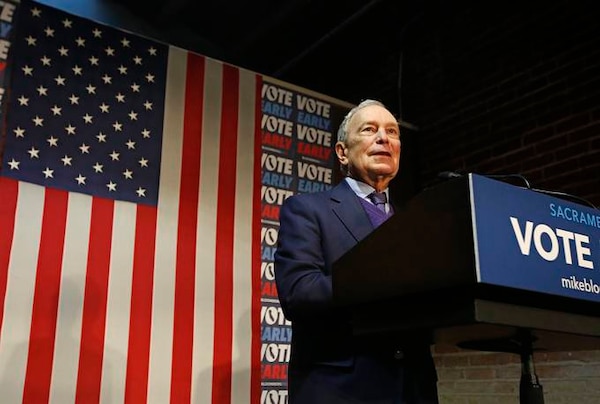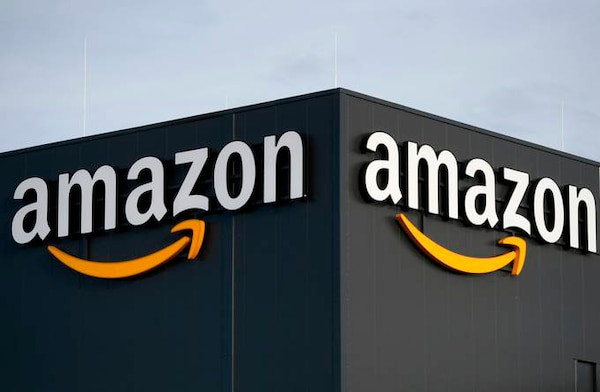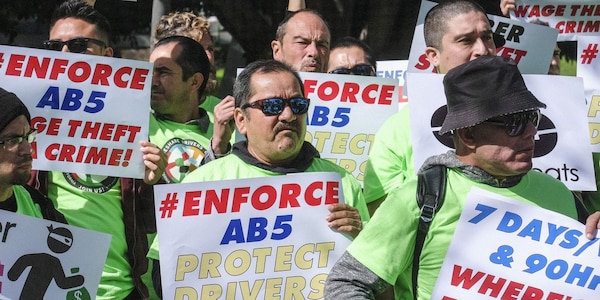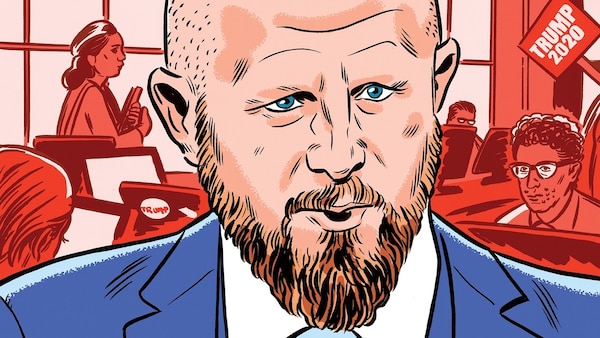Analysis | The Technology 202: Mike Bloomberg doesn’t need tech elites’ money. So they’re showing support in other ways. – The Washington Post

Mike Bloomberg addresses supporters during a campaign stop in Sacramento. (Rich Pedroncelli/AP)
Ctrl + N
Billionaire Mike Bloomberg’s vow not to accept campaign donations means tech industry elites are finding other creative ways to show their support.
Instead of opening their checkbooks, some of his backers in the industry are using their clout – both in person and online – to get the word out ahead of today’s Democratic primary election in California.
Thirteen tech leaders signed an open letter yesterday supporting the former New York mayor’s candidacy. The letter, a blistering rebuke of President Trump’s record on tech and immigration, argues that Bloomberg is the most qualified candidate to spur innovation in the economy.
“California — and America — need a President who understands and supports an economy that is based on innovation, competition, predictable and fair rules for all,” the letter said. “We need a President who will return America to its place as the global leader of tomorrow’s economy.”
The Bloomberg campaign is aggressively seeking support in Silicon Valley – and sees a big opportunity to snap up those who backed Pete Buttigieg, the industry darling who dropped out of the race two days ago.
But rather than host fundraisers in tech executives’ homes or dinners that require a donation for entry, the campaign says it is focused on building a network of “social bundlers” in lieu of financial bundlers.
“People have asked us how they can be helpful to the campaign and influence their friends,” says Michael Rolnick, a senior adviser to the Bloomberg campaign who is doing outreach to the tech industry.
The campaign is hosting conference calls and other events to explain how Bloomberg’s policies could appeal to potential supporters in Silicon Valley. Their end goal: to get tech titans to post on social media about their support for Bloomberg or send notes to their networks about the candidate.
The open letter is an example of this strategy paying off. Its signatories included SV Angel founder Ron Conway, Bessemer Venture partner Byron Deeter, CRV general partner Brett B. Rochkind, Glassdoor founder Robert Hohman and Roy Bahat, head of Bloomberg Beta, a venture arm funded by Bloomberg LP.
Bloomberg — who built a business empire based on financial computer terminals — has deep business ties dating back decades in the tech industry. He’s also positioned himself as a more business-friendly candidate. Yet concrete numbers of prominent supporters in Silicon Valley are murky, since Rolnick says the campaign is not tracking people as potential fundraising leads.
Rolnick says the campaign has benefited as other Democrats once popular in Silicon Valley drop out. Sen. Cory Booker (D-N.J.) and Sen. Kamala D. Harris (D-Calif.) were widely seen as two of the tech industry’s favorite candidates early last year, and some of their supporters have backed Bloomberg since they dropped out. Rolnick said the campaign is in touch with supporters of Buttigieg and billionaire Tom Steyer.
“With each one, we’ve had people come to our campaign,” Rolnick said. “We’ll see the same thing this time.”
The Bloomberg camp has been working to ensure that his policies on tech issues stand out from other candidates. For example, during a recent call with venture capitalists, campaign officials discussed how Bloomberg’s policies could be friendly to the start-up community, especially as tech elites grow increasingly concerned about the prospect of self-described Democratic socialist Bernie Sanders winning the Democratic nomination.
Unlike Sanders and Sen. Elizabeth Warren (D-Mass.), who called for tech giants to be broken up, Bloomberg has taken a much more moderate tone, saying earlier this year that breaking up the companies is “not the answer.” Sanders’s policies on taxes could also spell trouble for the tech community.
Bloomberg’s other tech-friendly policy platforms are resonating with industry leaders, as highlighted in their letter. One key area is in his promised investment for research and development: Bloomberg would invest heavily in generating scientific breakthroughs in areas such as public health, hydrogen power, green technology and sustainable agriculture, according to his “All-In Economy Plan.” He plans to create 30 new job growth hubs.
Bloomberg also says he will invest in rural broadband, empowering a single authority to coordinate various technical assistance program, and in technical education. Bloomberg has also promised to invest in apprenticeship programs and streamline federal technical training programs. He has a focus on small business, promising to provide funds for towns to create entrepreneurship centers and increase the budget for the Small Business Investment Company program, which offers subsidized financing to help small businesses.
And of course, there’s immigration, a hot-button topic in Silicon Valley. Bloomberg says he will “implement policies that attract job-creating innovators and entrepreneurs and create new place-based visas that allow localities to address unmet needs,” according to his campaign website.
BITS, NIBBLES AND BYTES

Facebook. (Loic Venance/AFP/Getty Images)
BITS: Pharmaceutical advertising on Facebook is increasing even as the social network bans advertising based on health data, my colleague Nitasha Tiku reports. Drug companies are exploiting loopholes in the policy to serve consumers targeted ads about the personal health.
Once hesitant to advertise on Facebook, pharmaceutical companies tripled spending over the past two years to nearly $1 billion. Instead of medical history, advertisers can target ads based on demographics, consumers’ offline purchase history and whether a user has interacted with a specific Facebook Page or ad. (They cannot serve ads based on group membership.)
Patient advocates worry that the ad targeting could cause discrimination or even affect insurance rates.
“Knowledge about us shouldn’t be used to target us, to limit our choices, or manipulate our human vulnerabilities,” Andrea Downing, a moderator for a Facebook group for women at risk for breast cancer who filed a 2018 complaint with the Federal Trade Commission about Facebook’s privacy practices, told Nitasha.
And the concerns could escalate as Facebook solicits more health care-focused ads and encourages user groups focused on health.
Advocates say federal agencies such as the Food and Drug Administration and laws such as the Health Insurance Portability and Accountability Act (HIPAA) need to be modernized to protect patients online.
“We should be demanding that policymakers really think about not just the Facebooks of the world, even though they’re an important, but the larger economy of data mining and digital profiling that is totally invisible to the average user, but also the average doctor,” Kirsten Ostherr, a digital health technology researcher at Rice University, told Nitasha.

A traveller wearing a protective face mask as a precautionary measure uses her cell phone at the international airport in Brasilia, as the second case of coronavirus was confirmed in Brazil, March 2, 2020. REUTERS/Adriano Machado
NIBBLES: Fake coronavirus cures and other related conspiracy theories are flooding Facebook-owned WhatsApp in countries including Nigeria, Brazil and Ireland, my colleague Tony Romm reports. Facebook and public health officials have struggled to combat the theories, which “have instilled fear, troubled businesses and created public-health headaches for governments.”
WhatsApp has partnered with regulators in 15 countries to set up tip lines on the app where health officials can send updates to users, but the public health crisis raises serious concerns about how Facebook can tackle misinformation spread via encrypted messaging as it intends to expand the privacy measure to other platforms. WhatsApp is encrypted so that only the recipient and sender can see the message, making it impossible for Facebook to monitor the content as it has with similar harmful coronavirus-related content on its other platforms, such as the main service and Instagram.
In recent weeks, WhatsApp users throughout Africa and Asia reported a stream of text messages and voice memos in private channels that pitch fake coronavirus cures, according to copies of the messages shared with The Post. Others exaggerate the number of infected individuals or falsely report business closures. Governments in Brazil, Botswana and Singapore issued warnings about unverified information spreading on the apps, but the rumors have been hard to contain.
“I’m not quite sure how much they can do in terms of actually policing WhatsApp content the way they police Facebook content,” Tolu Ogunlesi, a top new-media adviser to Nigerian President Muhammadu Buhari, told Tony.

Visitors look toward the “Painted Ladies,” a row of historical Victorian homes, in front of the San Francisco skyline from Alamo Square Park in San Francisco. (AP Photo/Jeff Chiu)
BYTES: Digital services have concentrated in just a few major, coastal cities over the decade, rather than disperse more broadly, Mark Muro writes on the Brookings Institution website today.
As a result, many metro areas are losing their shares of the overall tech sector. Muro’s new analysis shows top five metro areas with the highest shares of the nation’s digital services industry accounted for 28 percent of all of these jobs nationwide in 2018, while the top ten accounted for 44.3 percent. The same top ten regions captured almost half of the new tech jobs in the United States from 2010 to 2018.
Meanwhile, 63 of the country’s 100 larger metro regions saw their share of the tech sector decline. Metro areas such as Providence, R.I., Little Rock, Ark., Virginia Beach, Va., and Stockton, Calif. lost five percent or more of their tech employment between 2010 and 2018.“The upshot is sobering: ‘Winner-take-most’ seems more the rule than the hoped-for ‘rise of the rest,’” Muro wrote. “And that’s a problem we will need to confront more directly than we have until now.”
Muro’s analysis comes as policymakers are increasingly taking note of the uneven distribution of tech jobs throughout the country. As we wrote in The Technology 202 last week, Rep. Ro Khanna (D-Calif.) has a new plan to spur tech innovation in the country’s heartland.
Muro told me in an interview that this is an issue with bipartisan interest from policymakers. “What is increasingly clear, though, is that tech-based growth will likely not diffuse out into America’s up-and-coming midsized cities and small towns on its own,” Muro wrote.
FAST FWD

An Amazon driver leaves after making a delivery March 2 to the Life Care Center of Kirkland, the long-term care facility linked to several confirmed coronavirus cases in the state, in Kirkland, Wash. (David Ryder/Reuters)
The coronavirus continues to send shock waves through Silicon Valley.
More covid-19 cancellations: Both Google’s Cloud Next and Microsoft’s MVP Summit, set to take place in April, have been canceled, the companies announced. They will now offer attendees virtual sessions instead. That brings the number of tech-related events canceled in the wake of coronavirus concerns up to 19, according to a BuzzFeed News list.
- SXSW will be missing some key attendees this year: Facebook, which already canceled its F8 developers conference, also announced it would pull out of SXSW, Rob Price at Business Insider reported. Twitter CEO Jack Dorsey also pulled out of the event and an online petition with over 25,000 signatures calls for organizers to cancel the conference.
At least there’s Slack. Silicon Valley companies are also increasingly urging their workers to stay at home, regardless of if they’re demonstrating symptoms. Twitter became the first major U.S. company to encourage its entire 5,000-person staff to work remotely, Sam Dean at the Los Angeles Times reported.
- Facebook has banned employees from bringing friend and family visitors and is limiting on-site interviews, Rob Price reports.
Wall Street could feel the effects well into the remainder of 2020. Airbnb’s plans to take the company public this year could be derailed as decreased travel hurts the company’s bottom line, Olivia Carville at Bloomberg News reports. Uber also called out the coronavirus as a “material risk” to its business, Lora Kolodny at CNBC reports.
- Uber did reinstate the hundreds of accounts it suspended in Mexico after those passengers allegedly rode with drivers who may have had contact with the coronavirus, the Verge’s Sean O’Kane reports.
Gig economy employees are still in the lurch. Lyft issued short guidelines to drivers advising them to wash their hands and stay at home if they feel sick, Sean reports. The guidelines are similar to an alert that Uber issued to drivers that my colleague Nitasha previously covered.
Want the latest reporting on the coronavirus? Sign up for “To Your Health” a new Washington Post newsletter that will bring you everything you need to know about the spread of the coronavirus in the U.S. and abroad.
Clarification: This item has been updated to reflect that Google Cloud Next and Microsoft MVP Summit will offer virtual sessions.
PUBLIC CLOUD

Amazon’s logo. (Ina Fassbender/AFP/Getty Images)
– Online retailers such as eBay and Amazon could face legal challenges if they don’t vet their marketplaces for dangerous counterfeits under new legislation introduced by a bipartisan group of members of the House Judiciary Committee. (Amazon CEO Jeff Bezos owns The Washington Post).
“Consumer lives are at risk because of dangerous counterfeit products that are flooding the online marketplace. Congress must create accountability to prevent these hazardous items from infiltrating the homes of millions of Americans,” said Rep. Doug Collins (R-Ga.), who helped introduce the bill.
The Stopping Harmful Offers on Platforms by Screening Against Fakes in E-Commerce (SHOP SAFE) Act builds on concerns raised by the Department of Homeland Security and Government Accountability Office that online retailers have become a hotbed for counterfeit items.
— More news from the public sector:
Lyft and Uber Start Spending to Unseat California Legislators
Ride-hailing companies are signaling their willingness to spend big to unseat state legislators who backed a law that could classify drivers as full-time employees rather than contractors.
Wall Street Journal
The Man Behind Trump’s Facebook Juggernaut
Brad Parscale used social media to sway the 2016 election. He’s poised to do it again.
The New Yorker
PRIVATE CLOUD
— News from the private sector:
Facebook says it removed five foreign influence campaigns in February
Facebook on Monday said it removed five online misinformation campaigns connected to foreign countries in February, the latest indication of governments seeking to sow discord using one of Silicon Valley’s most powerful so
The Hill
Apple to pay up to $500 million to settle U.S. lawsuit over slow iPhones
The settlement calls for Apple to pay consumers $25 per iPhone, which may be adjusted up or down depending on how many iPhones are eligible.
NBC News
#TRENDING
— Tech news generating buzz around the Web:
Can YouTube Quiet Its Conspiracy Theorists?
A new study examines YouTube’s efforts to limit the spread of conspiracy theories on its site, from videos claiming the end times are near to those questioning climate change.
The New York Times
CHECK-INS
— Coming up:
- The House Subcommittee on Government Operations, will hold a hearing to examine whether programs at the General Services Administration (GSA) designed to facilitate the modernization of existing technologies and the adoption of new technologies on Wednesday starting at 2 p.m.
- The House Committee on Small Business will hold a hearing titled Building Blocks of Change: The Benefits of Blockchain Technology for Small Businesses at 11:30 a.m. on Wednesday.
- The Senate Judiciary will host a hearing “Dangerous Partners: Big Tech and Beijing” on Wednesday at 2:30 p.m.
- The House Consumer Protection and Commerce Subcommittee will hold a hearing on the proliferation of deceptive and dangerous products on online marketplaces Wednesday at 10 a.m.
- The Senate Judiciary Subcommittee on Antitrust will host a hearing on “Competition in Digital Technology Markets: Examining Self-Preferencing by Digital Platforms” on March 10 at 10 a.m.
- Nava Public Benefit Corporation will host a conversation moderated by the Technology 202’s Cat Zakrzewski on “Impact at Scale: From Big Tech to Civic Tech” at 6 p.m. on March 10.
- The Code for America Summit will take place March 11-13 in Arlington, VA.
- SXSW will take place in Austin March 13-22.
- FCC Commissioner Geoffrey Starks and FTC Co missioner Rebecca Kelly Slaughter will jointly host a field hearing in Detroit, Michigan on 5G technology and big data on March 16 at 1 p.m.
- The Game Developers Conference will take place in San Francisco March 16-20.












